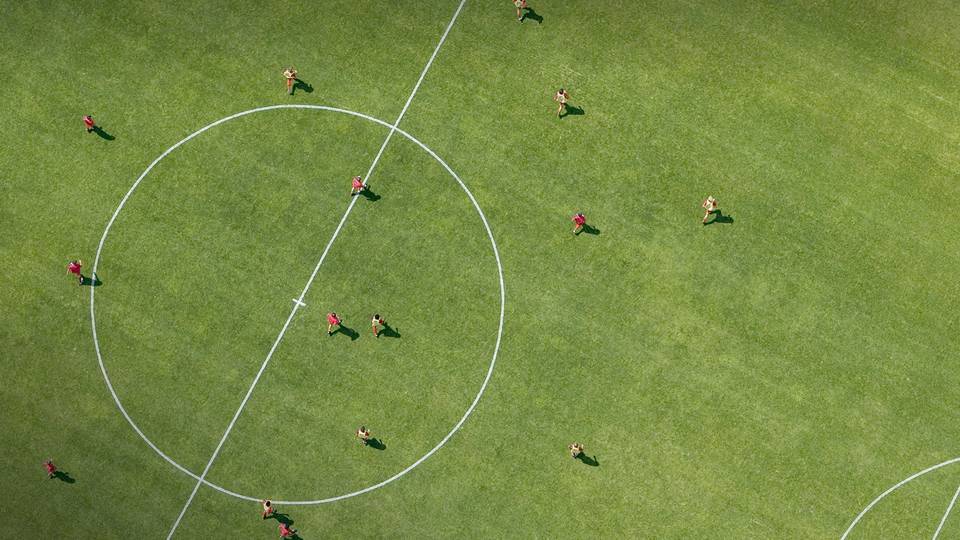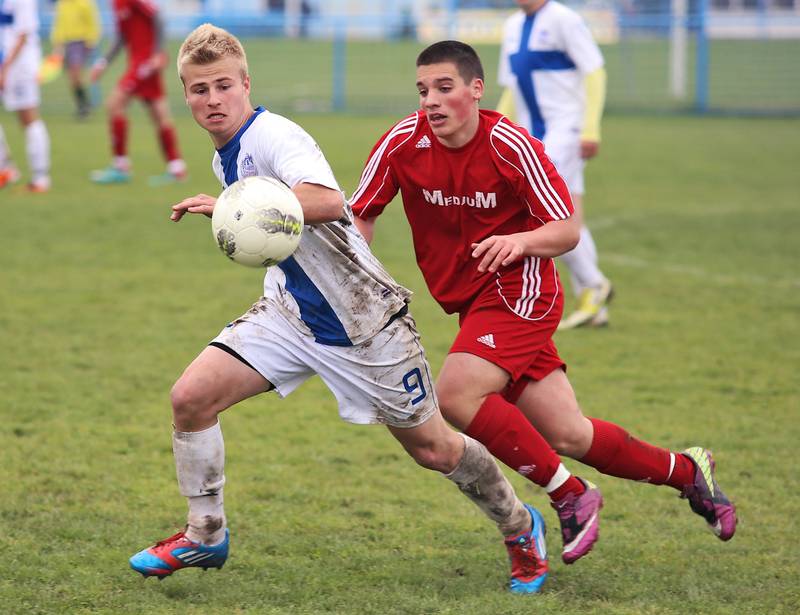Understanding the rules of U14 football is essential for coaches, players, and parents involved in youth football development. At this age group, young footballers transition to a more structured version of the game that closely resembles the adult format. U14 football is played with 11 players per side, including a goalkeeper, using a size 5 ball—the same size used in professional matches.
The pitch dimensions and game structure become more standardised at U14 level, with matches typically consisting of two 30-35 minute halves. Rules regarding free kicks, throw-ins and the offside rule conform more closely to FIFA regulations, with opponents required to be at least eight yards from the ball during free kicks. This age group represents an important developmental stage where young players fully engage with the tactical and technical aspects of the game.
While some regions may refer to it as youth soccer, U14 football in the UK follows specific guidelines designed to promote skill development while introducing more competitive elements. Coaches at this level focus on refining technical abilities while introducing more complex tactical concepts, helping young players prepare for the higher demands of teenage and adult football.
Overview of U14 Football Competitions
U14 football competitions serve as a crucial developmental stage for young players transitioning to the full 11-a-side game. These competitions balance competitive elements with fair play principles, creating an environment where technical skills and tactical understanding can flourish.
Competition Structure
U14 competitions typically follow the 11-a-side format, adhering closely to standard FIFA rules with some key modifications for youth development. Teams compete in league structures organised by local football associations or regional youth leagues. According to established guidelines, U14 team rosters may consist of up to 22 registered players, though only 18 can be selected for each match day.
Most competitions run from September to May, with some tournaments held during school holidays. The structure often includes a main league season followed by cup competitions, providing varied competitive experiences for young players.
Matches are typically 70 minutes long (35 minutes per half), though this can vary by league. The pitch dimensions are smaller than adult pitches but larger than those used in younger age groups.
Fixture and Stats
Fixtures are usually scheduled on weekend mornings, with some midweek matches during summer months. Most leagues aim to provide each team with approximately 20-30 competitive matches per season, balancing player development with appropriate rest periods.
League stats follow the traditional points system:
- 3 points for a win
- 1 point for a draw
- 0 points for a loss
Goal difference serves as the primary tiebreaker when teams finish level on points. Fair play rankings often feature prominently in youth soccer competitions, with disciplinary records potentially affecting final stats.
Fixture scheduling typically accounts for school terms and holidays, with breaks built into the competition calendar. Many leagues implement rotation policies to ensure all registered players receive adequate playing time throughout the season, reflecting the developmental focus of U14 football.
U14 Football Rules and Regulations
At the U14 level, youth football transitions to more formal play that closely resembles the adult game. Players at this age are expected to understand and apply the basic laws of the game while developing their tactical awareness.
Specific Rules for U14
U14 matches are typically played as 11v11 format on a full-size pitch. The game uses a size 5 ball, the same as in the adult game. Matches generally consist of two halves of 30-35 minutes each, though exact timing may vary by league.
Free kicks follow FIFA regulations with the modification that opponents must remain at least eight yards from the ball rather than the standard ten yards in adult football. This slight adjustment accommodates the younger players' developing skills.
Throw-ins, direct kicks and the offside rule conform to standard FIFA regulations. This helps prepare young players for senior football as they progress through the youth system.
Substitutions are often more liberal than in professional matches, allowing coaches to give playing time to all squad members.
Discipline: Red and Yellow Cards
Disciplinary procedures at U14 level mirror the adult game, using the standard yellow and red card system. Yellow cards serve as formal cautions for minor offences like unsporting behaviour, dissent, or persistent fouling.
Red cards result in dismissal from the match for serious offences such as violent conduct, spitting, or denying an obvious goal-scoring opportunity through a deliberate handball.
Officials typically apply rules with some consideration for the players' age and development. The primary focus remains on player safety and education rather than strict punishment.
Players who receive red cards typically face automatic suspension from the next match. Leagues may implement additional disciplinary measures for repeated offences to emphasise the importance of fair play and respect within the game.
Coaches play a crucial role in reinforcing proper conduct and helping young players understand the consequences of their actions on the pitch.
Player Development and Adult Participation
Youth football at the U14 level represents a crucial period for player development. Adults play a vital role in supporting young athletes through appropriate substitution strategies and fulfilling their responsibilities as team officials.
Substitutions and Playing Time
Effective substitution management is essential for player development in U14 football. Coaches should aim to provide balanced playing time for all squad members, allowing each player to experience different match situations.
The FA recommends a minimum of 50% playing time per match for each player. This ensures young footballers have sufficient opportunity to apply training concepts in competitive environments.
Substitutions in U14 matches are typically 'rolling', meaning players can return to the pitch after being substituted. This flexibility helps coaches manage fatigue while maximising developmental opportunities.
Teams should establish clear substitution protocols before matches. This might include planned rotations at set intervals or substitutions based on positional needs.
Quality playing time matters more than quantity. Even brief appearances should be meaningful, giving players clear objectives and feedback.
Role of the Adult Member
Adult members serve as positive role models in youth football. Their primary responsibility is creating a safe, supportive environment where players can develop both technical skills and love for the game.
Adults must complete appropriate safeguarding training and background checks. The welfare of young players must always be the primary concern of any adult involved with the team.
Coaches should focus on long-term player development rather than short-term results. As noted in the search results, all players need to develop competence in position-specific skills, but excessive specialisation should be avoided at this age.
Adult members must obtain proper qualifications for their roles. This typically includes basic coaching certificates, first aid training, and safeguarding certification through the FA or equivalent governing body.
Adults should maintain appropriate communication with parents regarding player progress and team matters. Clear, consistent messaging helps create a positive football experience for everyone involved.
In some regions, the term 'soccer' is used interchangeably with football, but the fundamental principles of adult responsibility remain consistent regardless of terminology.
Special Events and Charity Cups
Special football events and charity competitions offer young U14 players unique opportunities to develop skills while contributing to worthy causes. These events often have specific eligibility requirements and modified rules to accommodate their charitable or celebratory nature.
Organising Special Matches
When organising special championship or promotion matches for U14 teams, player eligibility rules must be strictly observed. According to standard codes of practice, players cannot represent a team in special championship matches unless they've met specific registration requirements.
Special events require clear communication about deadlines and participation criteria. Tournament organisers should distribute information packets that outline the unique rules that may differ from regular season play.
These matches often feature modified game durations, substitution allowances, and disciplinary procedures. Organisers must ensure all participating coaches understand these variations before the event.
For international special events, teams must be registered with their national football association or CONCACAF nation to participate.
Charity Cup Guidelines
The Dublin Charity Cup and similar tournaments welcome youth teams in good standing that are registered with recognised football associations. Home teams, typically appearing first on the match schedule, are responsible for providing the match ball unless tournament organisers supply it.
The NMIFA and other regional football organisations frequently host charity tournaments with specific guidelines about team composition and player eligibility.
For Charity Cup competitions, organisers should clearly explain the acceptance process and any special requirements in the tournament handbook.
Tournament rules often stipulate that all players must wear appropriate kit with numbered shirts and proper footwear. Match officials have final authority regarding player equipment and safety concerns.
Most charity events implement a point system (typically 3 points for a win, 1 for a draw) and establish clear tiebreaker procedures for determining advancement to knockout stages.












